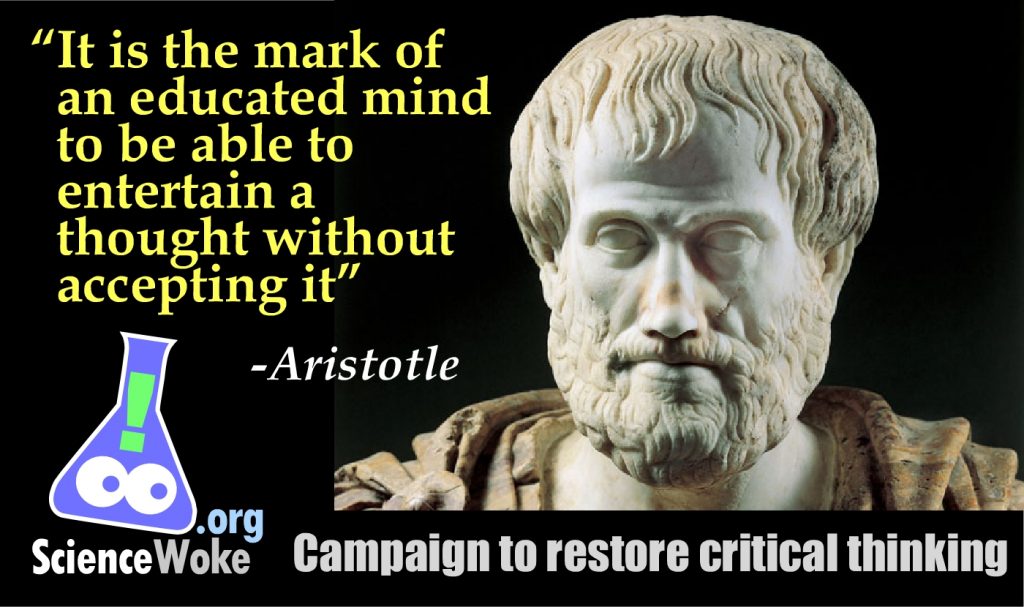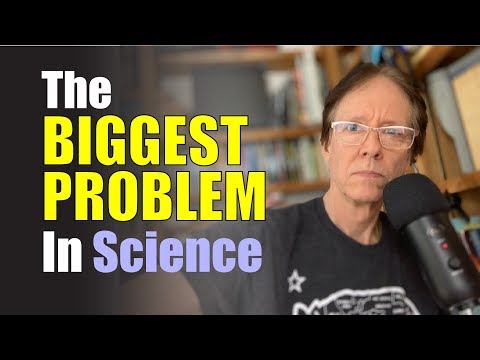The biggest problem in science today isn’t our theories or models. It isn’t our universities or institutions. It isn’t our technology or need for the next “bigger” particle collider. It isn’t even the mainstream or dissidents. It is something much more insidious. Yet 99.9% of us are guilty of this and no one talks about it. But I’m going to talk about it today and better still, I will tell you how I broke the habit of doing it myself.
The biggest problem in science today has to do with time. Not space-time or relativity. Not time in the scientific sense. But human sense. The fact is, we don’t spend enough time looking at other people’s work or what others have to say. We let others do the thinking for us. And that may be the most damaging aspect of science progress today.
Let’s face it, there is an immense amount of science going on in the world and an even larger amount of people blogging and vlogging about it on the internet. How can we possibly read or watch everything about everything scientific? It is impossible.
Therefore, the easiest thing for to do is to read an article or listen to someone on YouTube and trust that they took the time to investigate something that you don’t have time to investigate yourself. Maybe it’s a science evangelist you like who always uses inspiring words and has a smooth delivery. Maybe it is a columnist in a very “reputable” science magazine or newspaper that you have read for many years and trust. Or maybe it is a YouTuber who tries to put together interesting videos about science like me.
No matter who it is, it is easier and takes a lot less time to let others think for us when it comes to science. It is easier to let others take the time, read the book cover to cover, study the theory, understand the equations, or go through a science article and all its references. We are all very busy and to understand science: IT TAKES TIME.
I am not here to tell you that you should take time to learn in depth everything you are interested in. That is impossible in today’s information overload. I am however, telling you that it causes great problems in the scientific community and greatly stifles scientific progress. And both mainstream science and the dissident community are equally to blame.
Let’s look at a favorite subject of both dissidents and mainstreamers alike: relativity.
Science Evangelists
I had the chance to meet and hear in person, Bill Nye the science guy. Bill has become a cheerleader for science and during his talk at a local high school near my home, he pulled out his smartphone and held it up to the audience of mostly young high school students. He said to them that the GPS on this cell phone wouldn’t function accurately if it wasn’t for the theory of relativity, both special and general. I had to bite my tongue since I was not there as a private citizen. I actually looked away so I wouldn’t say something I would regret.
Some time ago, I did a video on this channel about Neil DeGrasse Tyson’s answer when asked if Einstein could ever be shown wrong. He answer? Laughing.
Both of these incidents have everything to do with not taking the time to properly and fairly investigate the science being espoused. Bill Nye and Neil DeGrasse Tyson trust 100% Big Physics and Big Cosmology. They themselves are mouthpieces for Big Science and never challenge what is being said. They explicitly state that their job is not to judge, but to communicate.
But what if Nye and DeGrasse took the time to look at counter arguments against relativity like all good critical thinkers should? If they did, they would certainly not be talking or laughing about relativity or teaching it in the same way.
If they would take the time as many of us have to review the work of Ron Hatch, Dr. Edward Dowdye, and Dr. Cynthia Whitney they would see relativity failing in spectacular fashion. What if Bill Nye who held up his cell phone were to have studied the work of Ron Hatch? Ron is a world expert in GPS in which he holds over 30 patents and who says that a GPS shows the flaws in relativity rather than supporting it. Bill Nye who preaches that GPS uses relativity would have most likely kept his cellphone in his pocket.
What if Neil DeGrasse Tyson were to read Dr. Edward Dowdye’s work on light and gravity? Dr. Dowdye is a retired NASA scientist who has evidence that light only bends in the coronas of suns and outside the coronas, light doesn’t bend as predicted by Einstein. Tyson in stead scoffs at the very idea that Einstein could be wrong and completely abandons the change to not only learn himself, but to teach others to be critical thinkers.
But if you think that Big Physics and Big Cosmology are the only ones to blame for not taking the time to truly understand concepts and all sides of a science topic, think again. Dissidents do the same.
Aetherist Problem
I know this next part is not going to be popular with many of today’s aetherists, but you watch this channel because I try to tell it like it is. So here goes…
Aether if you remember is the theory that says light must be a wave in some type of medium, just like sound waves are waves in air.
Many of today’s modern aetherists in the dissident community do not take the time to read aether’s critics who are also in the dissident community. In the early 1990s and 2000s, most in the dissident community were against aether because of a few intractable problems like transverse waves, and immense elasticity needed in an aether theory. A majority of modern aetherists choose not to take the time and understand these criticisms. They prefer to try to solve gravity with aether instead of addressing the major concerns.
I have seen many people in the comment area of this YouTube channel talk as if aether is the only model that can exist in order to give physicality to light. That aether is inevitable or that is was wrongly abandoned by scientists in the past. It is a given in their mind that aether is a fact. Yet, if they were to take the time to investigate, they would find that new particle models and lattice models can also describe light and perhaps, without the problems pointed out by aether’s detractors.
I am not here to say aether is wrong or right or for those working on aether to stop their work. I am saying however that most dissidents in the aether community choose not to take the time to read arguments against aether and that is no better than mainstream science rejecting aether theories outright.
Another problem in the dissident community is that dissidents often shun other dissidents who have more radical views on the universe. One such group that often gets shunned in the dissident community is the Electric Universe. Many dissidents frown upon the electric universe community for their belief that the universe is more electric than gravitational and that large planetary features like the grand canyon were caused by great catastrophic electrical discharges. To many dissidents and mainstreamers alike, this is too far away from a comfortable reality to even take the time to see what are talking about.
This attitude is wrong. But I’m going to tell you how to change it. I know how to change this attitude because I had to teach myself this same attitude. I had no one to help me. I had to learn this on my own. Ever since 2008 when I started helping the NPA, now the CNPS, I had to grapple with the fact that there were many competing theories out there and that our organization needed to support them all.
Once I took the time to find that we are in model revolution, I can now teach you how to change your attitude so that you will not be caught in the trap of “not taking the time”.
The attitude you need to take when confronted by a new theory, or a new criticism of an existing theory Aristotle tells us: “You must entertain the new thought without accepting it.” That means you have to give every argument the chance to be correct. That is very hard at times. Take this recent book I received in the mail about the hollow earth.

I can hear you now: “hollow earth? RIGHT!!!” I used to think the same thing. Now we I get a book, the crazier the title, the more excited I get. I see this as a chance for an in incredible opening up of the mind. I never know within the pages of a book, or in logic of a failure of some current theory, therein lies the possibility for the very important “ah-ha” moment waiting for me.
Here is the book: “Bubble Earth – Space Time Gravity and the Evolving Earth”. I of course immediately turned if over and found that I agreed with almost everything the author Nicolaus Vern says on the back cover. And I quote:
Discussions of space and time are usually centered on such things as multiple dimensions and black holes – add a dash of philosophy and you might have “a feeling not unlike that awaked by thoughts of the occult” – (sayeth) Albert Einstein. However, time and space can, and should, be understood as being structurally simple. We need to believe that space is a primordial and eternal nothingness, and time emerges from the structure that has come to exist within it. This structure has a rate of change and this rate of change becomes our definition of the rate-of-time. Time and gravity are the symptoms of this entropic structure within space.
Nicolaus Vern
Impossible Problems Still Worth It
If I were a science teacher and a student came to me and said: “I want to write a paper on how the world is flat”, today I would tell them “Absolutely! – Go for it!”. Most science teachers, maybe all science teachers would probably tell give their student all the reasons we know that the world is not flat and steer the student away from taking to time to show something we think is completely untrue. But what does more damage? Not allowing a student to tackle an impossible or untrue statement, or not allowing them to discover something so important on their own?
When in college while getting my math degree, I decided I would try to come up with an empirical equation for the circumference of an ellipse. This is one of the known impossible tasks in mathematics that can only be answered with an infinite series. But instead of discouraging me, my math professor let me try. And try I did. For three months I tried everything I could in order to find an solution until I finally came to the conclusion that yes, it was impossible. And the conclusion I came to allowed me to explain simply that it was the curvature of an ellipse that was not a constant could never result in an empirical equation as does a circle. In a circle you have the same curvature around the entire circle and therefor you can find a constant which is pi and an empirical equation. You cannot with the circumference of an ellipse. It requires an infinite series.
When I started this channel and started leading our science society the CNPS, I made a conscious effort to look at any and all evidence with the eyes of a child. The eyes that give everything a chance to be true – no matter how absurd. To give a chance and voice to the person who spent copious amounts of time trying to come up with some organization or explanation for the universe. I see the variety in science as a present and lifeblood of progress, not some crazy idea that could never be true.
I guess I’m to science lovers what my math professor was to me: an cultivator of critical minds. Someone who sees that it is more important to cultivate critical thinkers than to judge whether those critical thinkers are right or wrong.
The work of judging what is right or wrong is strictly the domain for historians. The work of supporting critical thinking should be the work of any vibrant science community. And the science community should stay away from judging other’s truths. That only stifles science progress.
How to Change Yourself
Enough rambling. Now, what I promised. How to change your attitude to that of a true critical thinker. Something I learned myself. We are going to look at three different scenarios using this comment:
“expansion tectonics is better than plate tectonics by a mile”.
David de Hilster
There are three possible scenarios that you fall in to and you have to truthfully and honestly identify where you fall on all topics in science. Here they are:
- That’s the first time I have heard of expansion tectonics. That sounds intriguing, I will have to check it out myself.
- I have read about what others have said about expansion tectonics, I will have to look more closely at the data myself to make a reasoned judgement.
- I have spent time checking out the data for expansion tectonics and my opinion is…
The trick is to honestly, and I mean honestly identify where you stand on a subject. If you do that, your answer will not only be the correct one, but will allow you to not advance your own understanding of the universe, but you will actually have a chance to help science progress.





